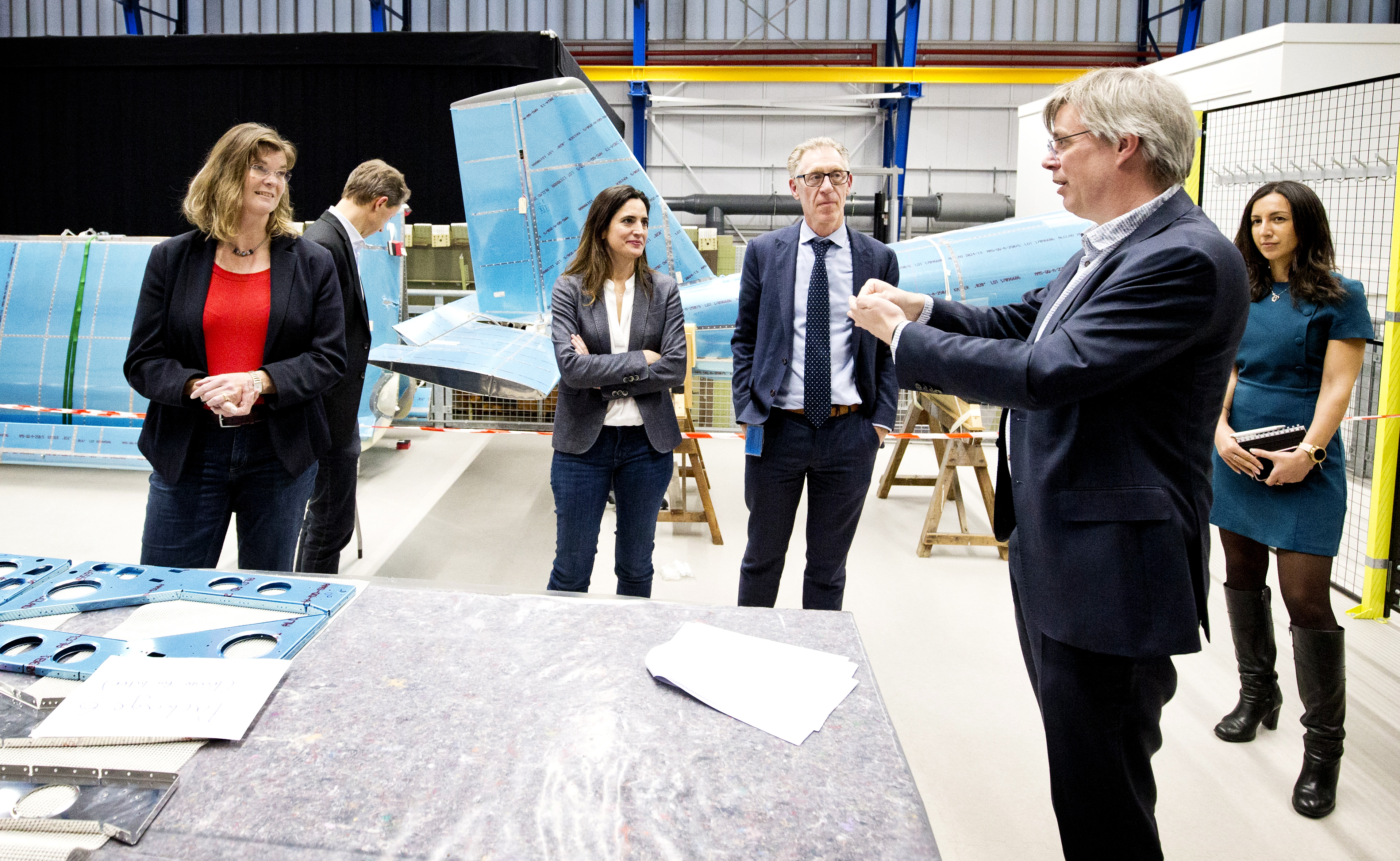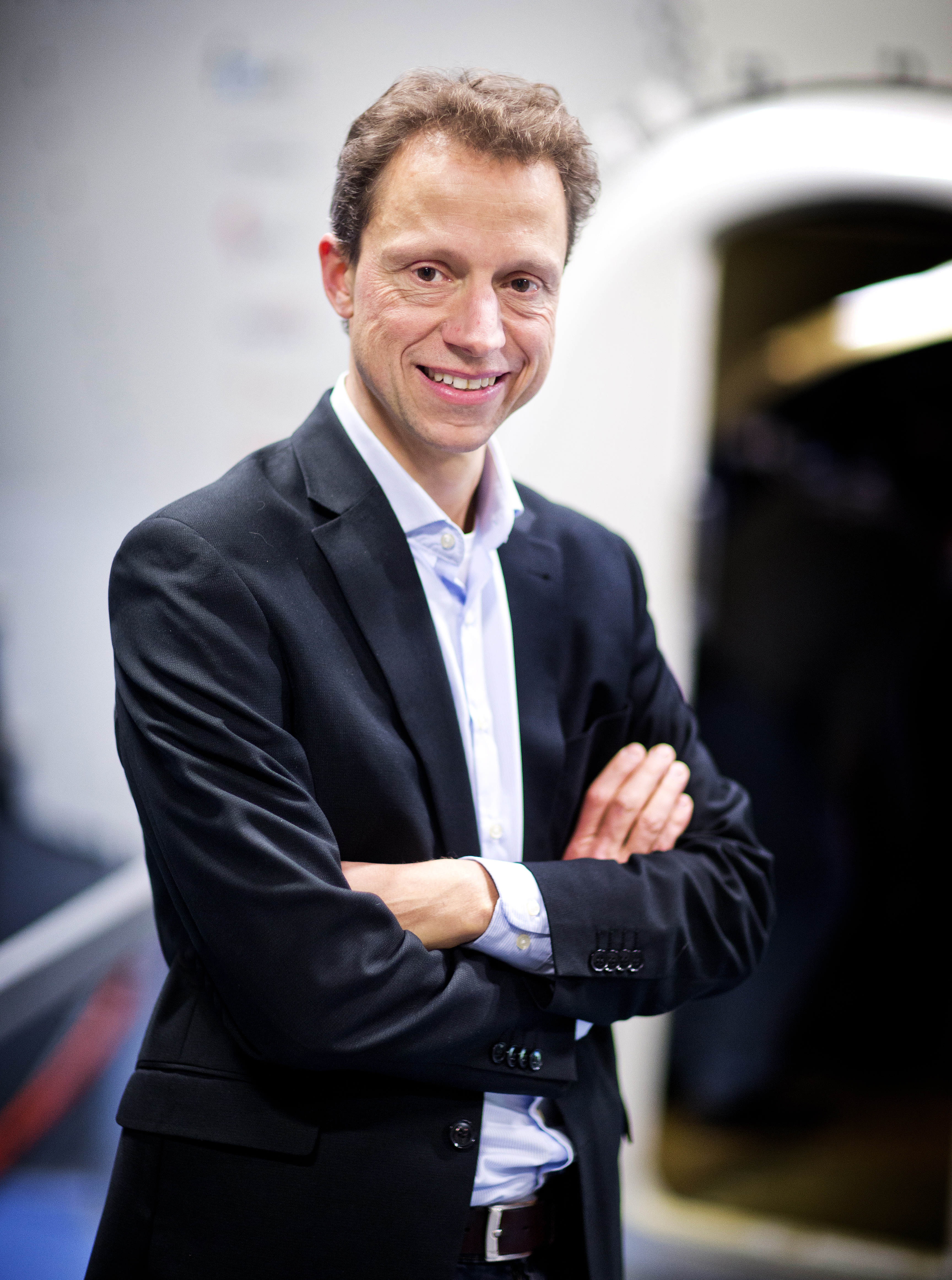Now boarding: Airbus and TU Delft collaborate on sustainable aviation
Aircraft manufacturer intensifies relationship and is new resident TU Delft Campus
“To have a disruptive aircraft in 2040, we have to start today and work together”, says Daniel Reckzeh, senior manager Research & Technology at Airbus. TU Delft and Airbus need to play an important role in this. “We have to meet this challenge, that is beyond dispute.”
Reckzeh was part of an Airbus delegation that visited the TU Delft Campus this December. The group visited the D: DREAM Hall, the Flying-V, e-Refinery, SAM | XL and the Faculty of Aerospace Engineering (AE).
Joint interdisciplinary Project and Aerospace Innovation Hub
The collaboration between TU Delft and Airbus is changing from traditional contract research to a dynamic, much more intensive relationship. For example, Airbus was one of the industrial partners who participated in the second pilot of the Joint Interdisciplinary Project. A group of 7 Master students worked on the “Gamechangers for Green Air Transport”. Reckzeh was the company coach for this group of students.
To facilitate this, Airbus has rented an office in the Aerospace Innovation Hub. The Aerospace Innovation Hub is the new incubator where start-ups, students, industry and researchers work together on innovation. With this Airbus has officially settled on the TU Delft Campus.
Delft mind-set
The office on the campus provides the ‘Airbus in Delft feeling’, says Reckzeh. “We are already working well together, but it is important to also be physically present.” TU Delft and Airbus want to deepen their relationship. “We need to know from each other what we are doing. What happens at Airbus and vice-versa? We want a network of people who know each other, inform and exchange the latest insights and wishes. Then you can boost the collaboration and get a lot more dynamics.”
Reckzeh likes what Delft has to offer in the field of aerospace engineering. He thinks the university can develop into a ‘hub in the academic landscape’ and a ‘preferred stopping point’ for Airbus when it comes to tapping into the latest research insights.
The ‘mind-set’ and ‘holistic approach’ of the Delft students and researchers, is increasingly becoming a unique selling point, Reckzeh says. TU Delft does not only look at the ‘bits and pieces’ – advanced technical solutions in subareas - but also at the complete picture: integrated solutions for major challenges, such as sustainable aviation.
D: DREAM Hall, SAM | XL and Flying-V
This all comes together in the ‘extraordinary’ D: DREAM Hall. It is very important to train engineers who are not only professionally good, but also know how to work on grand solutions, Reckzeh says. During the visit the delegation saw the <link d-dream teams forze>Forze Hydrogen Electric Racing car and received an update from AeroDelft.
SAM | XL also offers a ‘refreshing and new’ way of collaboration. Airbus and the field lab currently discuss how they can work together. Reckzeh pays special attention to the Flying-V. “What makes this aircraft interesting is that it looks at aviation in a completely new way, both in terms of design, sustainability and construction.”
Milestone in aviation
The switch to renewable energy will be the next big milestone in aviation. Traditional aircrafts cannot fly on hydrogen since the wings are too small for the amount of required fuel. With the Flying V this might be different. The smart design could be ‘a milestone in aviation’.
Will the aircraft ever be built? Not before 2040, Reckzeh reckons. It depends on developments in aviation whether the Flying-V will bring really big advantages over current aircrafts, which are also becoming more and more economical. “But it is certainly worth investigating. This can be a good example of the way we work together. Airbus cannot do everything itself, but we can help with our expertise to further develop this concept.”

Clear sky revolution
The pursuit of sustainable aviation is central to the TU Delft. Henri Werij, dean of the Faculty of Aerospace Engineering, called in his inaugural lecture ‘Let’s start the clear sky revolution’ to make aviation sustainable, once and for all. Airbus shares this mission. It is ‘beyond dispute’ that we must meet this challenge, says Reckzeh.
R&D for fully sustainable aircrafts must start today. “To have a disruptive aircraft in 2040, we have to start today and decide which direction we are going: flying on hydrogen, synthetic kerosene or a mixture of these. Before you have a radical innovation, 20 years are easily over.”
Reckzeh predicts that the role of Airbus will change. It is not just about a technical solution. With a hydrogen-powered aircraft, for example, the infrastructure of airports must be adjusted and the new sustainable fuels must be widely available. “This is a challenge that is much greater than just building a radical new aircraft. The entire aviation sector must change and Airbus must take the lead and indicate the direction.”
TU Delft
TU Delft also has an important role to play in this revolution, Reckzeh concludes. The university is strong in both aerospace engineering and renewable energy research. This combination is crucial for the coming decade. “TU Delft can play the role of an important hub in the academic landscape. Airbus cannot collaborate with 100 universities, we need strong players such as Delft who can initiate important developments themselves. ”
“To be really disruptive, we have to work together. TU Delft has the skills and the right mind-set. That is why we come here.”
